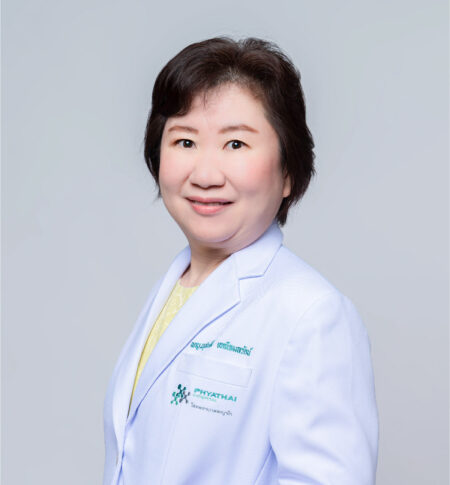
Dr. Nanthawan Khusuwan
The doctor chooses to combine both medical science and the art of communication so that children can understand, feel familiar, overcome their fears, and know how to prepare themselves for treatment.
The doctor chose to integrate both medical science and the art of communication to help children understand, feel familiar, alleviate fears, and know how to prepare for treatment. After completing her medical degree from the Faculty of Medicine at Chiang Mai University, Dr. Nanthawan Khusuwan continued her studies to become a pediatrician at the same institution. During her two years as a pediatrician, she further specialized in pediatric nephrology at Phramongkutklao Hospital.
Currently, Dr. Nanthawan serves as both a general pediatrician, treating common childhood illnesses, and a specialist in pediatric nephrology, particularly kidney diseases in children. She shared her inspiration and experiences during her studies:
“At first, I was interested in pursuing a career in pediatrics because doctors find happiness in caring for children. They are cute like white cloth; they show their distress so openly when they are sick, and once treated and healed, they express their joy. I find great satisfaction and pride in this aspect.”
When she became a pediatrician, Dr. Nanthawan realized she wanted to pursue further studies with her newfound interest. She decided to specialize in kidney diseases in children because some kidney diseases can be treated effectively if diagnosed and treated promptly.
Kidney diseases in children can occur at any age.
The group of patients Dr. Nanthawan looks after includes newborns, where kidney abnormalities can be detected through prenatal ultrasound, and she continues the diagnosis and treatment after they are born. In infants and older children, the symptoms of kidney diseases may include urinary tract infections, swollen bodies, foamy urine, blood in urine, headaches, high blood pressure, among others. In such cases, she takes a medical history and conducts further tests like blood tests, urine tests, electrolyte tests, and kidney function tests. Treatment may involve fluid management, dietary restrictions, and medications, while some cases may require dialysis or kidney transplantation, similar to adult patients.
“In recent years, I’ve noticed an increasing number of children with kidney-related diseases, and many of them are related to the urinary system. For example, urinary tract infections, hydronephrosis, ureteral obstruction, vesicoureteral reflux, as well as urinary retention. As a pediatrician, I also handle emergency cases in children with other diseases. Currently, I care for patients from newborns up to around 15 years of age.”
Dr. Nanthawan’s dedication to both the medical and emotional needs of her young patients makes her a compassionate and well-rounded physician. She strives to provide the best possible care to ensure the well-being and recovery of the children under her watchful care.
Integrating Advanced Medical Knowledge with Compassionate Patient Care
While studying pediatric kidney diseases, Dr. Nanthawan has embarked on a journey to learn about the care and treatment of kidney patients in Australia, particularly focusing on chronic kidney disease, kidney transplantation, pediatric dialysis, and post-transplant patient care. This has provided her with highly advanced medical expertise, enabling her to be well-prepared in treating similar cases.
Caring for pediatric kidney patients requires special attention and compassion, as these children often need prolonged hospital stays. They might not fully understand why they have to undergo extended treatments, especially when dealing with chronic diseases, which necessitate even more extended care.
“Most of the pediatric patients I care for require long-term treatment, so I approach their care holistically. This involves administering medications, dietary control, and explaining the treatment plan in a way that children can understand and accept, along with their parents or guardians. Parents want to know the reasons behind their child’s extended hospital stays, the treatment plan, and the progress. Close monitoring and building familiarity and rapport with the children are essential. Sometimes, I provide toys or fun activities to help the children relieve anxiety, especially the younger ones.”
For older children, it’s important to ensure they understand their condition by explaining the disease and providing educational materials, such as books or media, that simplify medical concepts and treatment options. Combining medical science with the art of communication helps children feel more at ease, less afraid, and better prepared for the treatment process.
Healthy Children Begin with Parents and Family Members
Children cannot seek medical attention on their own; they rely on their parents or guardians. Therefore, effective communication with parents is crucial in treating pediatric patients. Providing guidance on how to care for the child at home after hospital visits is equally important.
“When a sick child comes for treatment, we ensure their improvement before discussing and advising the parents on how to care for the child once they return home. Our approach involves comprehensive care, considering both the physical and emotional aspects to prevent recurrence. It’s crucial to understand the parents’ readiness, whether they can bring the child for follow-up appointments or if they need assistance in finding specialized experts elsewhere. We must genuinely care for both the child and their family.”
In healthy children, parents can prevent urinary tract infections by maintaining good hygiene practices and ensuring regular bowel movements. Providing adequate hydration is also essential. In case of illness, parents must administer prescribed medications as directed by the doctor and keep follow-up appointments consistently.











